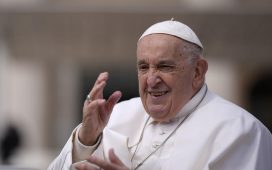In this week’s story, “God’s Caravan,” the protagonist, a boy named Earl Lovett, is captivated by a travelling preacher who has some unorthodox sermons to give. The idea of religious experience is so central to the story—what drew you to writing about the spiritual?
I’m attached to Catholicism because I was raised in it. But when I began to think about what I wanted religion to do in my children’s lives, I knew that I didn’t just want to give them something that I was passing down; I wanted to give them something that came with deliberation and thoughtfulness. Because I’m interested in my children’s relationship with religion, I find myself wanting to write about what religion actually does for children. Why does our culture tell children to believe in Jesus with the same fervor that it tells them to believe in Santa Claus? And how can kids find their way into something mature and complex if we are always delimiting for them what they should believe?
This isn’t really your question, though. Your question is about the spiritual. Now, here is where my Catholic ways never leave me, because I think that all of life is of the spirit—and I feel this to be especially true for people from what we might call the Catholic Diaspora, which includes people who are black, brown, Irish, etc. (That’s colonialism for you.) These are people who have, over generations, needed to fight in order to prove their humanity to others, even to other Catholics. Though it seems possible that most of history’s most awful shit has been done in the name of religion, I also know that people have mostly survived that awfulness because of a belief in the universality and the eternity of the spirit. Because how else do you survive, as Earl does, racism in America? If you don’t believe in the possibility of the spirit, it seems impossible to survive.
I think of myself as a religious writer. I think of myself, actually, as religious. Like, when I hear Christians talk about Christian fiction, I’m, like, Why aren’t they including me? Or Ann Patchett? Or Mary Gordon? I think it’s because we are raising questions about religion, in the tradition of what great religious thinkers have always done. And I think this while fully knowing that religion is one of the most fucked up things that humans ever invented. But I also write fiction. And I believe in the possibility of stories to transform our lives, to make our lives. And, for most humans, religion is the stories we have, the ones we have needed for generations, to keep on living.
This kind of wandering ministry, or small, independent church, has a history in the culture of the South, or brings to mind figures like, say, Father Divine. Were there any stories of itinerant preachers that inspired the story?
Oh, yes! I was thinking of a kind of mix between Bishop Charles Mason (who was actually in Memphis) and the revolutionary Marcus Mosiah Garvey. I named my eldest child after Garvey—that’s how much I dig that man and the things he taught. I believe that these men did great good for the people who followed them. And yet, who can say that Garvey didn’t mislead? Who can say that Garvey wasn’t opportunistic? Who can say that the church Mason founded hasn’t deprived people of grace, with its leanings toward misogyny and homophobia? There is no perfect messenger. No perfect prophet—even in the Bible. But I am really curious about how this type of prophet-preacher makes us feel besotted—in love, really—and therefore sometimes can bring us to something brave, and then sometimes to something great.
Is a figure like Pastor John laying claim to a special kind of authority, or a certain kind of creative license?
Pastor John is insane. I’m joking. But also, I’m not all-the-way joking. “Monster in the Middle,” the forthcoming book from which this story is excerpted, is in part about how social ills, such as the lack of a social safety net, can actually foster a kind of mental unwellness in those affected. And that this mental unwellness can be passed on, inherited. So, yeah, Pastor John is a bit messed up.
But also, I think he genuinely wants to save people, to help people. Preachers are storytellers—they aren’t so different from fiction writers. They are trying to seduce with words. They are trying to bring you to them, win you over. In both cases, the pastor and the writer want to transform you. In both cases, there is authority and creative license. The most convincing pastor is the one who tells the best stories. I have never met a pastor or a fiction writer who was any good who didn’t feel authoritative enough to interpret, to reconfigure in order to transform.
Although Pastor John’s stories and songs seem strange or syncretic, the community of Soulsville responds with enthusiasm. Why do you think his parishioners are so attracted to what he has to tell them? Is there something that they feel is missing from their “ordinary” spiritual life?
Pastor John is not pretending. He’s making stuff up; he’s performing. But he’s not pretending that his message isn’t really about getting people of color to honor their bodies and their minds. He’s saying, “If I have to sing and dance and talk about Jesus to get you to know that you are worthy of this world, then that is what I will do. And if I can make some money doing it, all the better.” And, as far as I can tell, that is what people go to church for: to know that they are connected to the divine. Which in lay terms really just means that we go to church to know that we are worthy of this life and all the love that may come with it and after it. And to be reminded that other people are worthy, too.
This is why those fire-and-brimstone churches can be so evil. Because they are often making their parishioners feel worthy of God’s love by denying other people (gay people, for example) God’s love. It’s like being in an abusive household where the love is limited and you are taught to feel good about yourself when your brother gets whipped. Pastor John, for all his flaws, is not abusive. Pastor John says, “All of you here are worthy. All of you here are good; all of you here are carrying Jesus inside of you.” In fact, he goes further: he says that Jesus himself was fucked up, flawed, did cruel things as a child. And Jesus still got to be God’s son. So why not all of us?
Perhaps something that Earl feels like he is missing is the presence of his father, who suffers from schizophrenia. How were you thinking about the relationship of fathers and sons? And between “hearing voices” and this intense feeling of conversion?
So much of the language around the more mystical elements of religion looks a whole lot like mental illness. We’ve got male saints whipping themselves almost to death. We’ve got female saints having sex with a phantom Jesus. This is crazy shit. Now, I’m not saying that Saint Theresa wasn’t really having ecstasy with Jesus. I’m not at all, because I do believe that I have my own deep, spiritual relationship with a real divinity. But it’s crazy to believe in something you cannot prove. It’s dumb. You shouldn’t. In fact, it’s our deep insistence on believing things that make no sense that have some religious people not believing in the very real, provable truth of climate change.
Now, I am a mother, and I can’t think of anything more insane than a mother’s love. When my children walk out of the door, I feel like a literal part of my self is out there—a part of my self more important than the part I am. That is no way to be mentally healthy. Love, belief in God—these things are crazy. And yet, these are the best things we humans do. The very best things we have ever done. So much of what is beautiful, lasting, strong, uplifting has been done in the name of love and in the name of God. And yet, if we do these things, love and believe, without constant and rigorous questioning, we will lose our humanity. Which is why I believe in literature—because it can get us to believe. But if it’s any good, it’s also going to get us to believe by making sure that we arrive with our curiosity and our doubt well developed, too.
Midway through the story, Earl receives a new name. It’s unusual to see a character’s name changed permanently in a short story—is there something about the short form in particular that you wanted to experiment with?
I have said often that short stories are utilitarian for me. Often I use them to help teach me some craft skill that I need for the other forms I work in—poetry and the novel. And yet, the short story is the form I enjoy writing the most. There is something about the precious capsule of perfection that the short story has been in our literary culture that I am really challenged and excited by. In college, my peers and I were often told what short stories could not do. And I thought, Well, what if they did do those things? Could they still be good? Could they be great? And, of course, the right response to any creative “don’t” is always to try to do it, but do it well (and by “well,” I mean with love, with authority, with trepidation, with hope). Every chapter in “Monster in the Middle” is a story that takes on some element of fiction craft. “God’s Caravan” is very much thinking through close third-person, especially from the perspective of a child who has no psychic distance from the action. It’s me thinking through that great American form, the coming-of-age story. This is the seminal moment in Earl’s life. He becomes Fly. He becomes something separate from his parents. This is how Pastor John saves him: by getting him to question his parents, by getting him to believe in his own singular possibilities.








